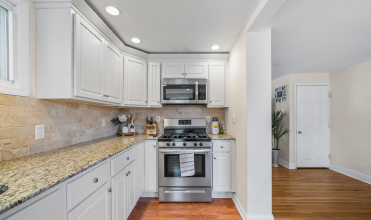
Kitchen remodeling is one of the most popular home improvement projects because the kitchen is not only the heart of the home but also a space where functionality and aesthetics need to align perfectly. If you’re planning to remodel your kitchen, one of the first questions that may come to mind is: “How long does a kitchen remodel take?”
While there’s no one-size-fits-all answer, we will break down all the elements that affect the duration of a kitchen renovation, give you a realistic timeline, and explain how to make the process more efficient. By the end of this guide, you’ll be equipped with the knowledge to set realistic expectations and understand why hiring a professional is crucial to getting the project done right and on time.
What Factors Influence the Timeline of a Kitchen Remodel?
Before diving into specific time frames, it’s essential to understand the factors that will impact how long your kitchen remodel will take. Some of the most significant elements include:
- Scope of the Project
- Minor remodels (like cabinet refacing, new countertops, or a backsplash) take much less time than major overhauls, which may involve removing walls, relocating plumbing and electrical systems, or changing the kitchen layout entirely.
- Design and Planning Phase
- Proper planning can either make or break the timeline of a kitchen remodel. Delays often occur in this phase due to design revisions or waiting for permits.
- Hiring Professionals vs. DIY
- While doing parts of the remodel yourself can save on labor costs, it can significantly extend the timeline, especially if you’re inexperienced. Hiring professionals will likely speed up the process.
- Material Availability
- Some materials or appliances may take weeks to arrive after ordering, so lead times for deliveries can affect the timeline. Custom cabinets, for example, can take 6–8 weeks.
- Permits and Inspections
- Major remodels usually require permits, especially if you’re making structural changes or altering plumbing or electrical systems. The process of getting permits and scheduling inspections can add weeks to your timeline.
- Existing Condition of the Kitchen
- If your kitchen is older or has underlying issues (like faulty wiring or plumbing), fixing these problems can add to the overall time of the project.
- Size of the Kitchen
- Larger kitchens obviously take more time to remodel than smaller ones, simply due to the increased surface area and space that needs work.
The Typical Kitchen Remodel Timeline: A Breakdown
Below is a general timeline for a typical kitchen remodel, assuming that you’ve already hired a contractor, finalized your design, and are ready to get started. The time frames can vary depending on the factors mentioned earlier, but this is a reliable breakdown of what to expect.
1. Pre-Remodel Planning (2–4 Weeks)
Before any demolition begins, you will spend time in the planning phase. During this time, you will:
- Develop a clear design vision for your kitchen (cabinetry, countertops, appliances, etc.)
- Hire a contractor (if you haven’t already)
- Finalize the layout and design plans with your contractor or designer
- Obtain permits if necessary (which can take up to 2 weeks depending on your locality)
- Order materials (cabinets, countertops, appliances, lighting fixtures, etc.), some of which may have lead times of several weeks
Delays in this phase are common if you change your mind about the design or materials or if permits take longer than expected.
2. Demolition (1–2 Weeks)
Once everything is planned and permits are secured, the demolition begins. Depending on the scope of the project, this could range from a couple of days to two weeks. The process includes:
- Removing old cabinets, countertops, and flooring
- Tearing down walls (if you’re going for an open-concept kitchen)
- Disconnecting appliances and utilities (water, gas, electricity)
A kitchen that’s being entirely gutted takes longer to demo than one that is just getting a cosmetic facelift.
3. Structural Changes and Rough Work (2–4 Weeks)
If your kitchen remodel involves major structural changes, like relocating walls, windows, or doors, this part of the project will add more time to the remodel. During this phase, your contractor will:
- Make any structural modifications (like removing walls or framing new spaces)
- Reroute or relocate plumbing if sinks, dishwashers, or gas appliances are moving
- Reroute or upgrade the electrical system (adding outlets, lighting fixtures, etc.)
- Install or modify ventilation systems (for range hoods or exhaust fans)
This is also the phase where inspectors may come in to ensure that all plumbing, electrical, and structural changes are up to code. Inspections can add a few days or weeks to the timeline depending on your locality and inspector availability.
4. Flooring Installation (1–2 Weeks)
Once the rough work is complete, the next step is installing new flooring. Depending on the type of material you choose, this phase can vary in length. Common flooring materials for kitchens include:
- Tile (can take longer due to setting and grouting)
- Hardwood or engineered wood
- Laminate or vinyl flooring (which is typically faster to install)
Make sure that the subfloor is properly prepared before the new flooring is installed, as this can affect the durability and longevity of your new kitchen.
5. Cabinetry and Countertop Installation (2–3 Weeks)
Cabinet and countertop installation is one of the most transformative parts of the kitchen remodel, but it can also be one of the longest. Here’s what to expect:
- Cabinet installation takes time, especially if they are custom-made. Pre-made cabinets may only take a few days, while custom cabinets can take up to 2–3 weeks.
- Countertops are typically installed after the cabinets are in place. If you’re going for natural stone like granite or quartz, you may need to wait for precise measurements and fabrication, which could add another week or two to the timeline.
Delays in this phase often occur when custom cabinetry or countertops are involved, as the production and delivery of these items can take time.
6. Appliance Installation and Hookup (1–2 Weeks)
Once your cabinets and countertops are in place, it’s time to install the appliances. This phase may include:
- Installing and connecting the appliances (refrigerator, oven, dishwasher, etc.)
- Hooking up plumbing for sinks and dishwashers
- Connecting gas lines for stoves and ovens
- Electrical work to connect lighting fixtures, outlets, and appliances
Professional electricians, plumbers, and installers are often involved in this phase to ensure everything is properly connected and functioning safely.
7. Finishing Touches (1–2 Weeks)
Once the major installations are complete, the final phase involves the finishing touches, which can take anywhere from a few days to a week. This includes:
- Painting and touch-ups
- Installing backsplashes
- Adding hardware (like cabinet handles and drawer pulls)
- Installing light fixtures
- Any final adjustments or fixes
This is also the phase where your contractor will do a final walkthrough to ensure everything meets your expectations.
Common Delays and How to Avoid Them
Even with a well-planned schedule, delays can happen. Here are some of the most common reasons for delays and tips on how to avoid them:
- Material Backorders
- Avoid delays by selecting materials with shorter lead times, and always order materials well in advance.
- Design Changes
- Once the remodel begins, changing the design can cause significant delays. Stick to your original plan as much as possible.
- Permits and Inspections
- Submit permit applications early and be proactive about scheduling inspections to avoid waiting for approvals.
- Unforeseen Issues
- Older homes may have hidden problems like faulty wiring or plumbing issues that weren’t anticipated. Budget extra time for potential surprises.
- Contractor Scheduling
- Hire a reliable contractor with a proven track record of sticking to timelines. Communicate regularly to ensure that everyone is on the same page.
What Can You Do to Speed Up the Kitchen Remodel?
While some delays are unavoidable, there are ways to help keep the project moving:
- Plan Thoroughly
- Spend extra time in the planning phase to make sure you know exactly what you want. The more decisions you make before the remodel starts, the fewer delays you’ll face down the road.
- Order Materials Early
- Once you’ve finalized your design, order your materials right away. Delayed deliveries can hold up the entire project.
- Hire Experienced Professionals
- A seasoned contractor or remodeling company can work efficiently and has experience dealing with common problems, reducing the chance of delays.
- Stick to the Schedule
- Try to keep the remodel moving by making yourself available for decisions, ensuring permits are in place, and being prompt with any input your contractor needs.
Conclusion: How Long Does a Kitchen Remodel Really Take?
On average, a full kitchen remodel takes about 6 to 12 weeks, depending on the scope of work and the factors we’ve outlined. Smaller remodels can take as little as 3 to 5 weeks, while larger or more complex renovations could extend beyond 12 weeks.
Ultimately, understanding the process and having a well-structured plan will help set realistic expectations and make the experience smoother. A kitchen remodel is a significant investment in both time and money, but with the right approach, it can transform your home and increase its value.
If you’re considering a kitchen remodel and want to ensure a timely and successful project, hiring a professional is one of the best decisions you can make. Whether you’re planning a minor update or a complete overhaul, an experienced kitchen remodeler will guide you through the process, handle unforeseen challenges, and help bring your dream kitchen to life within the timeframe you expect.
Transform Your Kitchen with Captivate Painting and Remodeling – Your Top-Rated Kitchen Remodeler!
Ready to transform your kitchen into the heart of your dream home? At Captivate Painting and Remodeling, we specialize in delivering high-quality kitchen renovations that are tailored to your unique style and needs. With our top-rated team of experts, we ensure a seamless remodeling process—from concept to completion—while staying on time and within budget.
Whether you’re looking for a modern update, a traditional makeover, or a complete overhaul, Captivate Painting and Remodeling is here to make your vision a reality. Our experienced professionals handle everything from design and demolition to installation and final touches, ensuring your kitchen is functional, beautiful, and built to last.
Don’t wait any longer to get started on your dream kitchen! Contact us today for a free consultation, and let our trusted team show you why we’re the top-rated kitchen remodeler in the area. Your perfect kitchen is just one call away!

